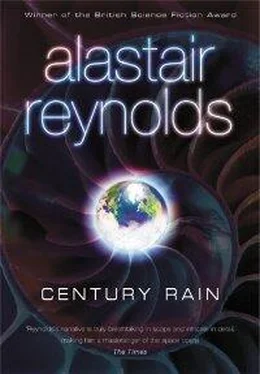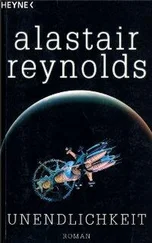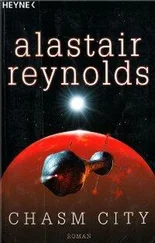Presently the shuttle began what she recognised as a braking and final-approach manoeuvre. Large Tanglewood structures loomed through the narrow little portholes. She saw spoked wheels, partial wheels, spheres and cylinders, all joined together like symbols in some weird alien language. While the basic architecture was not unusual by Tanglewood standards, this was not a district she recognised. The habitats were very dark and very old, crusted with the scar tissue of many layers of enlargement and reorganisation. Only a faint spray of tiny golden windows suggested any kind of human presence at all. Auger tensed: what the place most resembled was some kind of maximum-security prison or psychiatric complex.
In a particularly dark section of one of the spheres a little door clammed open, bracketed by red and white approach lights, and the shuttle aimed itself for this tiny aperture. Auger’s hands were sweaty on the map, the ink beginning to smudge and stain her fingers. She folded it and pushed it back inside her jacket, trying to stop her hands from trembling.
The shuttle docked and the agents escorted her through the airlock into a labyrinth of sterile black corridors, twisting and turning as they wormed their way deeper into the sphere.
“Where are we?” she asked. “What is this place?”
“You’ve heard of Securities,” Molinella said. “Welcome to Contingencies—our older, rather more secretive and manipulative brother.”
“It doesn’t exist.”
“That’s precisely the idea.”
They led her through a series of security checks, one of which featured a large Slasher-manufactured snake robot marked with the crossed-out “A” that meant it was most definitely not Asimov-compliant. Auger’s neck tingled as the robot studied her.
Beyond the security area was a short corridor ending in a door that was open a few centimetres, spilling a fan of orange light across the grilled black decking of the floor. An armed and goggled guard standing in front of the door observed their progress down the corridor. Sounds came through the gap: high-pitched scratching and scraping noises that set her teeth on edge. There was a regularity and structure to the noises that Auger identified as music, although she could not say exactly which kind. She set her jaw against the unpleasant sound, determined not to let it unsettle her, as was undoubtedly the intention.
The guard stood aside, gesturing for her to step through the doorway. She noticed that he had earphones on beneath his helmet. Molinella and Ringsted stood back, letting her enter the room alone.
Auger pushed the door open, getting the full blast of the music, and stepped through. Inside was a windowless room about the size of her entire apartment, but furnished to a much higher degree of opulence. It looked, in fact, rather like a recreation of a drawing room from the eighteenth or nineteenth century, the kind that might have belonged to some ardent scholar of the natural sciences. Behind an enormous desk stood an elderly-looking man who was engaged with fierce concentration in the business of making the music. He had his back to her; he was wearing a purple satin smoking jacket, his silver-white hair combed back from his forehead and falling over the collar. His hands worked the instrument that he held clamped under his chin. The fingers of one hand pressed on the strings, while the other sawed away with a long wooden bow. The man’s entire body moved in sympathy with the sounds he was making.
They were awful. Auger felt a faint but rising tide of nausea, but forced herself to stand her ground. The man reminded her of someone, someone she knew well, but in a completely different context.
Then he turned around, sensing her presence, and abandoned the music, letting the bow slide to a scraping halt.
It was Thomas Caliskan: the Musician. The head of Antiquities, and the man of whom she had recently made a personal enemy by denying him academic credit on one of her papers.
Caliskan placed his viola on the desk. “Hello, Verity. How good of you to come.”
At the entrance to the railway station, a bespectacled young man in a greatcoat tried to push a mimeographed pamphlet into Floyd’s hands.
“Read this, monsieur,” he said, his French accent well educated. “Read this, and if you agree with our aims, join us at the demonstration next weekend. There’s still a chance to do something about Chatelier.”
The kid was eighteen or nineteen, the hairs on his chin as fine as peach fuzz. He might have been a medical student or a trainee lawyer. “Why would I want to do something about Chatelier?” Floyd asked.
“You’re a foreigner. I hear it in your accent.”
“The passport in my pocket says I’m French.”
“Very soon, that won’t count for much.”
“Meaning I should watch my back?”
“All of us should,” the young man said. He forced the pamphlet into Floyd’s hand. Floyd crumpled it and was about to throw it away when some moderating impulse made him push it into his pocket, safely out of sight.
“Thanks for the warning, chief,” he said to the boy.
“You don’t believe me, do you?”
“Kid, when you’ve been around the block as many times as I have…” Floyd shook his head, knowing there was a gulf of understanding here that could never be explained, only experienced.
“It’ll start with the usual hate figures,” the young man said. “But it’ll end with anyone they don’t like the look of.”
“Enjoy it, kid. Enjoy feeling that you can make a difference.” Floyd flashed him a smile. “It won’t last for ever.”
“Monsieur…” the young man said, his voice trailing off as Floyd turned around and walked further into the station.
Gare de Lyon had begun the slow, drowsy decline into its nightly sleep. According to the clattering indicator boards, a few trains had yet to arrive and depart, but the evening rush hour was clearly long over. There was a chill in the air, blowing down through broken panes in the latticed metal roof that spanned the station. For the first time in months, Floyd remembered what winter felt like. It was an unwelcome memory that he’d kept boxed away, and he shivered.
He reached into his pocket for Greta’s letter, and came out instead with the political pamphlet the kid had given him. Floyd glanced back, but there was no sign of the young man. He balled the pamphlet and threw it into the nearest wastepaper bin. He found the letter he had been reaching for and re-read it carefully, satisfying himself that there had been no error, and that he was still on time.
“Late as usual, Wendell,” a woman said in heavily accented English.
Floyd snapped around at the instantly familiar voice behind him. “Greta?” he began, as if it could be anyone else. “I wasn’t expecting—”
“I made an earlier connection. I’ve been waiting here for half an hour, foolishly imagining that you might actually arrive more than a minute ahead of schedule.”
“Then that’s not your train pulling in over there?”
“Your detective skills obviously haven’t failed you.” Greta posed elegantly in a black thigh-length fur coat, one hand resting against her hip and the other supporting a cigarette holder at face-level. She wore black shoes, black stockings, black gloves and a wide-brimmed black hat tipped to eyelevel. There was a black feather in the hatband and a black suitcase at her feet. She wore black lipstick and, today, black eyeliner.
Greta was fond of black. It had always made life easy for Floyd when it came to buying her presents.
“When exactly did my letter arrive?” she asked.
“I received it this afternoon.”
“I posted it from Antibes on Friday. You should have had it by Monday at the very latest.”
Читать дальше












